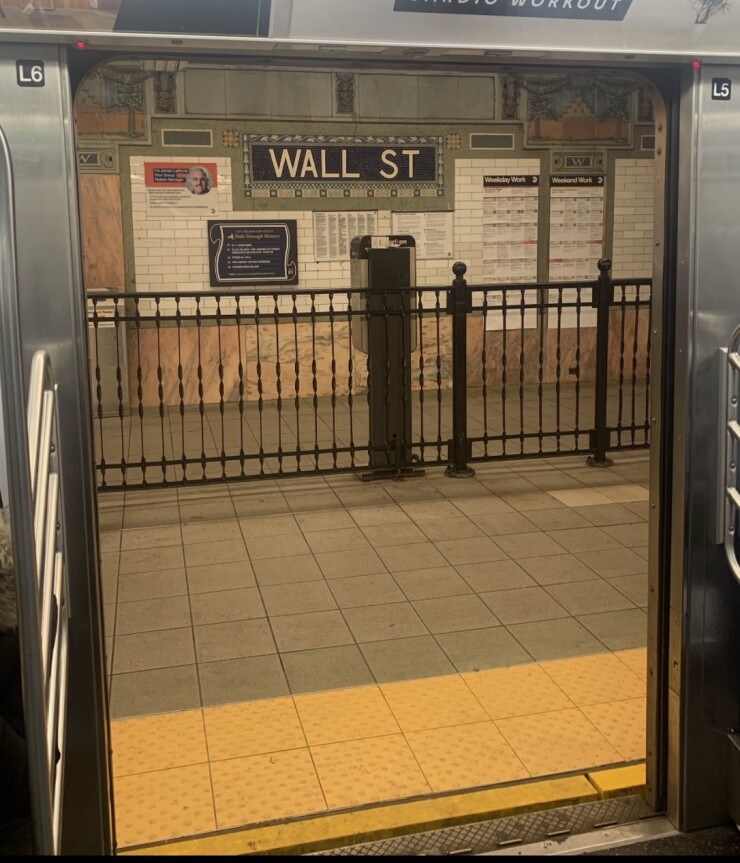Fitch Ratings upgraded the New York Metropolitan Transportation Authority's $1 billion of outstanding transportation revenue bonds (TRBs) to AA from A.

This is the highest rating the MTA has ever received from Fitch since the creation of the transportation revenue bond credit in 2002, the MTA said.
Fitch said its action was based on a review of the credit under the rating agency's revised government-related entities (GRE) rating criteria. Fitch also assigned an AA issuer default rating to the MTA, assessed its standalone credit profile at BBB-plus and assigned a stable outlook to the credit.
"The upgrade of the TRB rating reflects application of Fitch's revised GRE criteria, which explicitly recognizes the likelihood of support from New York State to the MTA," Fitch said.
"Under new criteria framework, Fitch has assessed the MTA's SCP at 'BBB+' representing our view of the MTA's creditworthiness absent extraordinary support from NYS, which, combined with a support score of 'extremely likely' under our GRE criteria, leads to an MTA IDR and TRB rating one notch below the New York State IDR (AA+/stable)," Fitch said.
"Gov. Hochul has consistently delivered for MTA riders and Wall Street has recognized that," said MTA Chair and CEO Janno Lieber. "This upgrade from Fitch reflects the continued growth of confidence in the MTA's sustainable financial strength, bringing tangible benefits when we look to finance critical transit projects."
The MTA said Fitch's action was indicative of the MTA's strong recovery and financial stability, surpassing the progress of the Authority's financial state even before the pandemic.
"Fitch's upgraded rating and stable outlook is a continued sign of confidence in the MTA's improved financial stability and proven state support to maintain that strong position," said MTA Chief Financial Officer Kevin Willens.
"A healthy credit rating is more than just a score, it can attract investors and lower interest rates at which the bonds are issued, ultimately reducing the cost of financing transportation projects and resulting in actual savings," he said.
Additionally, Fitch assigned an AA rating to the MTA's
Proceeds will refund some of the MTA's outstanding TRBs and the Triborough Bridge and Tunnel Authority's outstanding payroll mobility tax senior lien refunding bonds, Subseries 2021A-2, tax-exempt mandatory tender bonds, for debt service savings.
The TRBs are backed by a gross lien on the MTA's operating revenues, which include fares received from the subway and bus systems operated by MTA New York City Transit and its subsidiary, the Manhattan and Bronx Surface Transit Operating Authority; the commuter railroads operated by MTA Long Island Rail Road and MTA Metro-North; and buses operated by MTA Bus.
The TRBs are also backed by a gross lien on operating subsidies from the state and city as well from any surplus from MTA Bridges and Tunnels.
Evidence of the state's support includes the recent increase in the maximum rate of the PMT, which is now projected to generate an additional $1.1 billion in recurring annual revenues for the operating budget and significant funding for the capital plan, including congestion pricing.
As a component unit of the state, whose board members are appointed by the governor, the MTA's operational activities, financial performance and capital plan are subject to significant oversight and decision-making influence of the state, Fitch said.
"Although New York State does not have direct authority over the MTA operating or capital budget, it does have the authority to approve various dedicated tax revenues that account for a substantial portion of MTA resources," the rating agency said.





